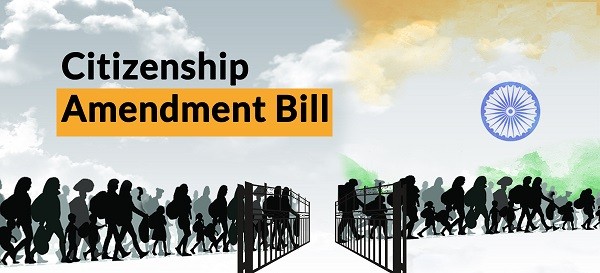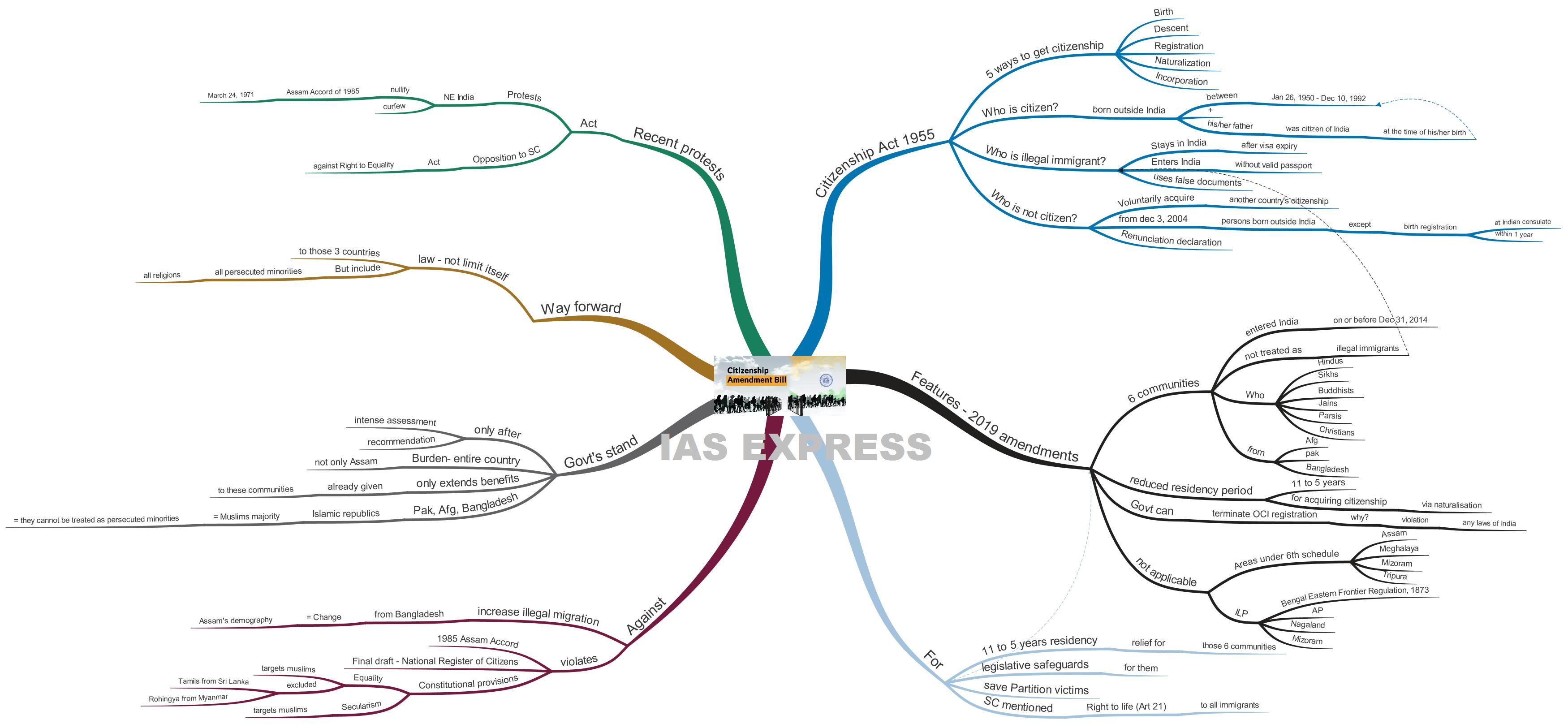Citizenship (Amendment) Act (CAA) 2019: The Conflict Between Humanity & Cultural Identity

Updates *
Recently, the Parliament has passed the Citizenship (Amendment) Bill, 2019 which seeks to ease norms for religious minorities from neighboring nations (non-Muslims) to get Indian citizenship by amending the age-old Citizenship Act, 1955. However, it has polarized regions in border states such as Assam since the locals fear that it will result in demographic change due to immigration. *
What are the key features of the Citizenship Act, 1955?
In India, the Citizenship Act, 1955 prescribes 5 ways to acquire citizenship viz – Birth, Descent, Registration, Naturalization & Incorporation of the territory.
Who is a citizen?
A person born outside India on or after January 26, 1950, but before December 10, 1992, is a citizen of India if his/her father was a citizen of India at the time of his/her birth.
Who is an illegal immigrant?
- An illegal immigrant refers to the person who enters India without a valid passport or stays in the country after the expiry of the visa permit.
- An immigrant who uses false documents for the immigration process is also an illegal immigrant.
- (In short, illegal immigrants of Hindu, Sikh, Buddhist, Jain, Parsi or Christian religious communities from Afghanistan, Bangladesh or Pakistan will be imprisoned or deported.)
Who is not a citizen?
- Under Article 9 of the Indian constitution, a person who voluntarily acquires citizenship of any other country is no longer an Indian citizen.
- From December 3, 2004, onwards, persons born outside of India shall not be considered citizens of India except their birth is registered at an Indian consulate within 1 year of the date of birth.
- If an adult makes a declaration of renunciation of Indian Citizenship, then he loses Indian citizenship.
Citizenship by naturalization
Under The Citizenship Act, 1955, one of the requirements for citizenship by naturalisation is that the applicant must have resided in India during the last 12 months, as well as for 11 of the previous 14 years.*
What are the key features of the Citizenship (Amendment) Act, 2019?
- It proposes that non-muslim communities such as Hindus, Sikhs, Buddhists, Jains, Parsis, and Christians from Afghanistan, Bangladesh, and Pakistan, who entered India on or before December 31, 2014, will not be treated as illegal immigrants even when they have entered India without valid documents. *
- It seeks to include a separate column in the citizenship form for applicants belonging to these 6 communities from those 3 countries.
- They will not be deported as illegal immigrants under the Passport (Entry into India) Act of 1920 and the Foreigners Act of 1946.
- Citizenship will be granted by relaxing the requirement of residence in India for citizenship by naturalisation from 11 years to 5 years for these migrants. *
- Exceptions: The provisions on citizenship for illegal migrants will not apply to two categories – states protected by the ‘Inner Line’, and areas covered under the Sixth Schedule of the Constitution. *
-
-
- Inner Line Permit (ILP): This is a special permit that citizens from other parts of India need to enter a state-protected by the ILP regime. Without an ILP granted by the state government, an Indian from another state cannot visit a state that is under the ILP regime.
- Sixth Schedule: relates to special provisions in the administration of certain Northeastern states (Assam, Mizoram, Meghalaya, and Tripura). It gives special powers for Autonomous District Councils (ADCs) in these states.
-
- It also empowers the government to withdraw registration as OCI due to any violation of the Citizenship Act or any other laws.
What is the need for an amendment? (Arguments for)
- Many people of Indian origin have been applying for citizenship under the Citizenship Act of 1955, however, they are unable to produce valid proof of their Indian origin.
-
- These include persons belonging to the 6 minority communities (Hindu, Sikh, Buddhist, Jain, Parsi & Christian) from Afghanistan, Pakistan and Bangladesh.
- Hence, they are forced to apply for citizenship through naturalization which prescribes 11 years’ residency in India as a condition. Such a long-term process denies them the opportunities and advantages that may apply only to citizens of India.
- Moreover, they are likely to permanently stay in India. Hence it highlights the need for some legislative safeguard to them.
-
- It will save the victims of the partition (Hindu-Bengalis) who got stuck in East-Pakistan (Bangladesh) in the early years.
-
- Notably, the religious minorities in Bangladesh are being persecuted by non-state actors (Islamic extremists) = many have crossed borders and settled down in Border States illegally and they remain stateless for years now.
- Thus the bill would prove to be a huge relief for those people.
-
- Bengali speaking region of Barak Valley in Assam has largely welcomed the proposal.
What are the arguments against?
- The bill has stirred protests in the Brahmaputra valley of Assam, which has a predominantly Assamese speaking population due to the reasons as follows.
-
- The bill will only aggravate the illegal migration from Bangladesh which might change the demography of Assam.
- It violates the 1985 Assam Accord, which was signed to end illegal Bangladeshi migration irrespective of religion. Under this accord, any person who came into Assam after March 24, 1971 (just before the Bangladeshi war) would be considered as a foreigner.
- The bill also violates the final draft of the National Register of Citizens (NRC) that excludes nearly 40 lakh people. Because the bill would grant citizenship to all Hindus who came to Assam from Bangladesh even after the NRC cut-off date of March 1971.
- So the bill is considered to be a threat to the cultural and linguistic identity of the people of Assam and other North-East states in India.
-
- Furthermore, the bill violates the basic tenets of the constitution.
-
- It violates the Fundamental Right to Equality under Article 14 by distinguishing illegal immigrants on the basis of religion and specifically targeting Muslims. Notably, the protection of Article 14 applies equally to both citizens and foreigners.
- It also violates the provisions of secularism in fundamental rights, directive principles and fundamental duties of the constitution.
- India has several other refugees that include Tamils from Sri Lanka and Rohingya from Myanmar. They are not covered under the Act. *
-
- It will be difficult for the government to differentiate between illegal migrants and those persecuted.*
What is the government’s stand on this issue?
- The government claims that these persecuted migrants will be eligible to apply for citizenship only after intense assessment and recommendation of district authorities and state government.
- The government has also clarified that Pakistan, Afghanistan, and Bangladesh are Islamic republics where Muslims are in majority hence they cannot be treated as persecuted minorities. *
- The beneficiaries under the Citizenship Amendment Bill can reside in any state of India = the burden of these persecuted migrants will be shared by the entire country and not only Assam.
- Moreover, these migrants were earlier given protection against legal action in the years 2015 & 2016. Long term visa protection was also granted to them. Thus the proposed amendment will only extend these benefits further to make these persecuted migrants eligible to apply for citizenship.
What is the way forward?
- While addressing the rights of Chakma refugees, the Supreme Court in NHRC vs. State of Arunachal Pradesh case provided equal protection before the law and rights under Article 21 (Right to life) to all immigrants including those who are considered as illegal.
- With the passage of this legislation, then by means of naturalization, these persecuted immigrants would be entitled to enjoy the benefits of rights guaranteed under the constitution of India, including equality, free of speech and expression, life, vote, work, food, etc.
- Hence, the law should not limit itself to minorities from Afghanistan, Pakistan, and Bangladesh, but also include refugees from persecuted minorities of all religions who have made India their home.
Recent protests *
- A large section of people and organizations in the Northeast, especially in Assam and Tripura, have opposed this new Act stating that it will nullify the provisions under the Assam Accord of 1985, which fixed March 24, 1971, as the cut-off date for deportation of all illegal immigrants irrespective of religion.
- Protests in the Northeast against the legislation have intensified in the past few days leading to the death of two persons due to police firing in Assam.
- The shooting was done in response to the thousands of people descending on the streets to defy the curfew.
- Several towns and cities were placed under indefinite curfew including Guwahati, the epicenter of the protests.
- The opposition has moved to Supreme Court to challenge this Act stating that it is violating the fundamental Right of Equality of the Indian Constitution as it intends to grant citizenship to a section of illegal immigrants by making exclusion on the basis of religion.
Test Yourself
Why is Citizenship (Amendment) Act, 2019 being opposed by many? Is it right for India to accept immigrants who are fleeing persecution on the basis of religion?
If you like this post, please share your feedback in the comments section below so that we will upload more posts like this.



Very well written, Santosh!